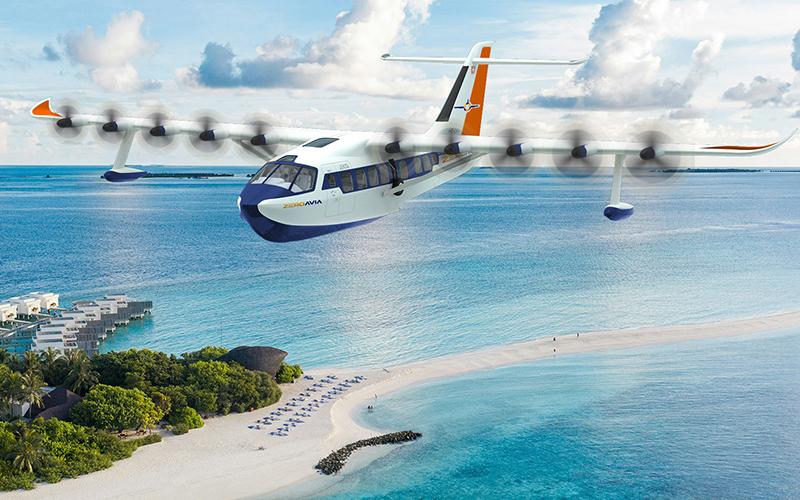
A rendering of Jekta's PHA-ZE 100 in ZeroAvia livery.
FARNBOROUGH—Jekta, the Swiss startup designing the electrically powered PHA-ZE 100 amphibian seaplane, has selected ZeroAvia to develop a hydrogen-electric, fuel-cell-powered version of the aircraft.
Jekta's original plan was to rely on batteries, but CEO George Alafinov says battery capacity has not increased as fast as he had hoped. Despite the higher acquisition costs, the hydrogen-electric option is attractive for the higher payload and greater range it may enable for the 19-seater, he says.
“The hydrogen system delivers a viable alternative to electric battery power that promises a significant increase in the range of our PHA-ZE 100, which will suit operators serving longer regional routes,” Alafinov says. “In contrast, the battery-power option will suit shorter-range missions and operators flying in locations where electric power is more cost-effective and accessible.”
Talks with ZeroAvia have been ongoing for a year, he says, adding that the hydrogen-electric option may be attractive to customers in the Middle East and Asia.
Jekta and ZeroAvia intend to develop and certify an integrated power-generation system (PGS), including inverters, other electronic components and a hydrogen tank and fuel system. They also plan to work on the infrastructure development with customers, Alafinov says.
ZeroAvia has been flying a prototype of its entire hydrogen-electric powertrain (ZA600) on a 19-seat testbed aircraft.
Jekta predicts the PHA-ZE 100, powered by ZeroAvia’s fuel-cell PGS, will achieve a range of up to 600 km (370 mi.), which is about four times that of the battery-powered version, and improve the seaplane's payload by up to 1 metric ton. Compared to batteries, a fuel-cell system is more durable, supporting a life of up to 20,000 hr., according to Jekta's estimates. The company expects operating and maintenance costs to benefit from that long service life.
The PHA-ZE 100 features 10 electric motors on the wing for redundancy. Current-generation motors allow for slower-turning propellers to reduce noise. The airframe will be all composites to avoid corrosion due to saltwater. Jekta has slated the first delivery for 2029.
